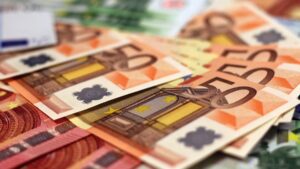
The relevant bill will be considered in the Bundestag.
If adopted, from June 1, 2022, citizens of Ukraine who have received a residence permit in accordance with the law on the stay of foreigners will receive social assistance in the amount of 449 euros. Now the amount of payments is about 300 euros. More than 400,000 Ukrainian refugees have already arrived in Germany, and about 3,000 more are arriving every day, according to the Ukraine Round Table held in Berlin on Monday with the participation of German Chancellor Olaf Scholz.
According to the information, more than 60 thousand Ukrainian schoolchildren are already studying in Germany, and graduates of Ukrainian schools were allowed to enter German universities without a diploma. According to the UN data, as of 13:00 on April 24, a total of 5.23 million people left Ukraine since the beginning of the war (excluding the entry flow), of which 2.91 million went to Poland, 843.74 thousand to Romania and Moldova. , Russia – 605.82 thousand, Hungary – 492.98 thousand, Slovakia – 355.59 thousand, Belarus – 24.48 thousand.
At the same time, according to the State Border Service, 1.17 million people have entered Ukraine by this date since February 28.

Minister of Economy and Finance Daniele Franco confirmed an intention of the Italian government to provide Ukraine with a loan of EUR 200 million, Finance Minister of Ukraine Serhiy Marchenko said in an interview with Italian Corriere della sera following the recent talks in Washington at the Spring Meetings of the International Monetary Fund (IMF) and the World Bank.
“We are negotiating to receive funds on concessional terms: at 1% per annum, with a maturity of 15 years. In my opinion, other countries can also offer us loans on such concessional terms. Such financing would certainly help us,” Marchenko said.
He also thanked Italy, which was the first of all countries to provide Ukraine with EUR 110 million on grant terms at the very beginning of the war unleashed by Russia.
The Ukrainian Finance Minister said that the preparation of an agreement on the next EUR 150 million loan from Germany, which will help support Ukraine’s macro-financial stability, has also recently begun.
According to him, only last week Germany provided a EUR 150 million loan to support small and medium-sized businesses, an agreement on which was reached back in March 2020.
“Minister Christian Lindner also noted that they are considering providing us with military support in the amount of EUR 1 billion, but we expected from Germany no less financial support than that provided to us by the UK, Canada or the United States,” Marchenko said.
According to him, Kyiv has high hopes for funding from the IMF managed account. “We encourage partner countries to consider reallocating 10% of their Special Drawing Rights (SDRs) that they received from the IMF in August 2021 and have not yet used. We are mainly targeting EU countries. However, specific rules should be agreed with the European Union and European Central Bank (ECB),” the Minister of Finance explained.
According to him, the EU countries will consider this issue, as there may be some restrictions on the use of SDRs by the ECB.
“But I think that countries will try to find a legal solution with the ECB to make SDRs available to Ukraine. The IMF is also working with other countries to find out how the allocated SDR quotas can be used to support Ukraine,” the minister said.
As reported, President of Ukraine Volodymyr Zelensky, in his speech at the Spring Meetings of the IMF and the World Bank, indicated that the country needs support of up to $7 billion monthly, and Prime Minister Denys Shmyhal noted that up to $5 billion is needed monthly to cover the budget deficit.

Germany will send 50 Gepard anti-aircraft systems to Ukraine, Canada 8 armored vehicles, Britain additional anti-aircraft systems, US Secretary of Defense Lloyd Austin said.
“I want to especially welcome Germany’s significant decision as Minister Lambrecht announced today that Germany will send 50 Gepard anti-aircraft systems to Ukraine. Yesterday, the British government announced that it would also provide additional anti-aircraft systems to Ukraine. Canada today announced that it would send 8 armored vehicles to Ukraine. This is important progress, we see more every day,” Austin said at a press conference following a meeting of defense ministers from more than 40 countries regarding Ukraine’s current and future defense needs at Ramstein Air Base in Germany on Tuesday.

German Foreign Minister Annalena Burbock said that Germany will gradually stop buying Russian energy resources, in particular, by the end of the year it will completely stop importing Russian oil.
“Security in Europe means that we reduce and stop our dependence on Russia, primarily in energy policy. We want to stop importing Russian gas, better today than tomorrow,” Burbock said on Wednesday, she is on a trip to Latvia and the press conference was broadcast by the German TV channel Welt.
According to the minister, Germany “made mistakes” in the past, so now it is necessary to stop importing energy carriers from Russia.
“From coal imports to the end of summer, we will halve oil imports by summer and bring them to zero by the end of the year,” Burbock said.

German Chancellor Olaf Scholz said that Germany is studying the list of weapons requested by Ukraine and plans to “find out what can be supplied quickly.”
“The lists include anti-tank weapons and air defense weapons,” Scholz told reporters in Berlin on Tuesday following a video conference with US President Joe Biden and other G7 leaders.
According to him, weapons that the Ukrainian army already knows how to use should be supplied. At the same time, the chancellor stressed that the possibilities of the FRG to supply arms were “almost exhausted.”
Scholz also said that NATO would not interfere in the conflict in Ukraine.
“NATO will not interfere in the conflict,” he said.
In turn, British Prime Minister Boris Johnson said, speaking in the House of Commons, that “NATO’s long-term goal should be to strengthen and strengthen Ukraine to such a level that Russia will never dare to invade again.”
At the same time, the President of the European Council, Charles Michel, following a video conference, said that the EU will create a special Ukraine Solidarity Fund, which will be used to support and restore Ukraine.
“We discussed with US President Joe Biden and like-minded partners a further coordinated response to Russia’s aggression against Ukraine. We discussed the need for further humanitarian, financial and military assistance. The EU will create a Solidarity Fund with Ukraine to immediately support and restore democratic Ukraine,” wrote the President of the European Council Charles Michel on Twitter.

On Monday, April 18, Minister of Internal Affairs of Ukraine Denys Monastyrsky met foreign rescue colleagues who arrived in Borodyanka (Kyiv region).
According to the press service of the Ministry of Internal Affairs of Ukraine, 11 professional rescuers from the United States, Australia and Germany have expressed a desire to come to Ukraine on a volunteer basis and help Ukrainian rescuers. In the near future, 1 more Polish representative will join the team.
It is noted that now they will work in Borodyanka, where they will be involved in dismantling the rubble and deblocking buildings.